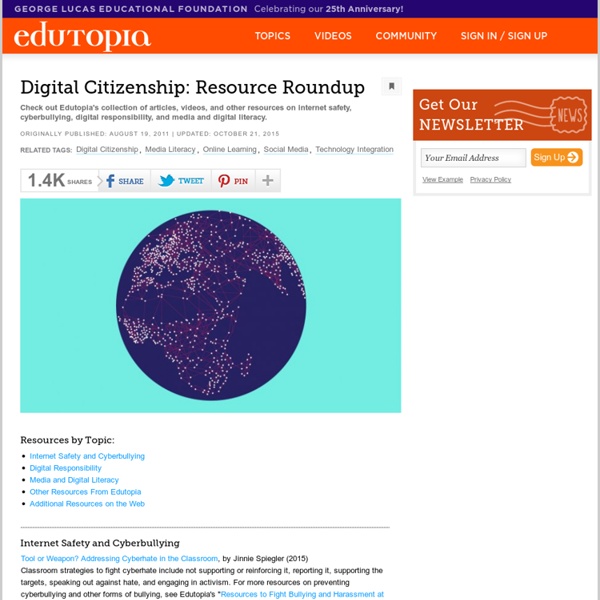Digital Citizenship Week: 6 Resources for Educators
Considering how ubiquitous smartphones and tablets have become, especially in high school and middle school, questions about managing use and educating students about digital etiquette are on a lot of educators' minds. This October, Common Sense Media is sponsoring Digital Citizenship Week from October 16 to October 22. And we wanted to pull together some of the best resources to help educators talk about digital responsibility and safety online.
Plan a "Digital Family Summit" to Engage Students and Parents
I recently had an opportunity to attend the first Digital Family Summit (DFS) in Philadelphia, Pennsylvania. Presenters and summit attendees were both parents and students. The "summit" included families from as far away as Canada, Utah, California, and of course those from local states and cities that could make the trip.
theconversation
Have you seen the how-to video of a teenage girl styling her hair that went disastrously wrong? She was obviously very disturbed by what happened, yet still uploaded the footage onto YouTube. Do you think a 45 or 50 year-old would upload an equivalent video of themselves? The majority of young people now share lots of things online that many adults question and feel uncomfortable about: their likes, dislikes, personal views, who they’re in a relationship with, where they are, images of themselves and others doing things they should or maybe shouldn’t be doing. In fact, a study undertaken in the US by Pew Research found that 91% of 12-to-17-year-olds posted selfies online, 24% posted videos of themselves. Another 91% were happy posting their real name, 82% their birthday, 71% where they live and the school they attend, 53% their email address and 20% their mobile phone number.
edutopia
Back in October, I wrote a post about Teaching Digital Citizenship in the Elementary Classroom. As it is Internet Safety Month, I want to share a sample lesson for teaching internet safety to students as young as kindergarten. Yes, you read correctly . . . kindergarten.
Information Literacy Competency Standards for Higher Education
The Information Literacy Competency Standards for Higher Education (originally approved in 2000) were rescinded by the ACRL Board of Directors on June 25, 2016, at the 2016 ALA Annual Conference in Orlando, Florida, which means they are no longer in force. This document (and the PDF) will remain on the website until July 1, 2017 to allow for the transition to the Framework for Information Literacy for Higher Education. ACRL is developing resources to assist librarians in using the Framework.
K-12 Digital Citizenship Curriculum
NEW! Learn the fundamentals of digital citizenship through choose-your-own-adventure interactive experiences DIGITAL COMPASS - Where are you headed? The only educational game that gives kids the freedom to explore how decisions made in their digital lives can impact their relationships and future. Bring a blended-learning approach to teaching digital citizenship DIGITAL BYTES teaches teens digital citizenship through student-directed, media-rich activities that tackle real-world dilemmas. Teens learn from peers' experiences then create collaborative projects that voice their ideas for making smart choices online.
Digital Citizenship Week 2015
Ask your students to create their own pledges.How can your students become super digital citizens? Ask them! Begin by encouraging your kids to write their own personal pledges about being good digital citizens in their everyday lives. A pledge could take the form of a motto or a slogan, a song, or a rap. It can rhyme, but it doesn't have to.Download our Student Pledge Activity Sheet and share it with your students to get them started. Want to challenge them further?
Forget coding, we need to teach kids about digital citizenry
"Stupid posts about embarrassing incidents or regrettable comments don't just go away because children grow up," writes Asher Wolf. Photo: Stocksy Growing up online is complicated. Social media profiles are increasingly being checked by university admissions boards, potential employers, government departments and insurance agencies. A throwaway comment made online by a child can be life-changing and almost impossible to scrub from the internet decades later.



